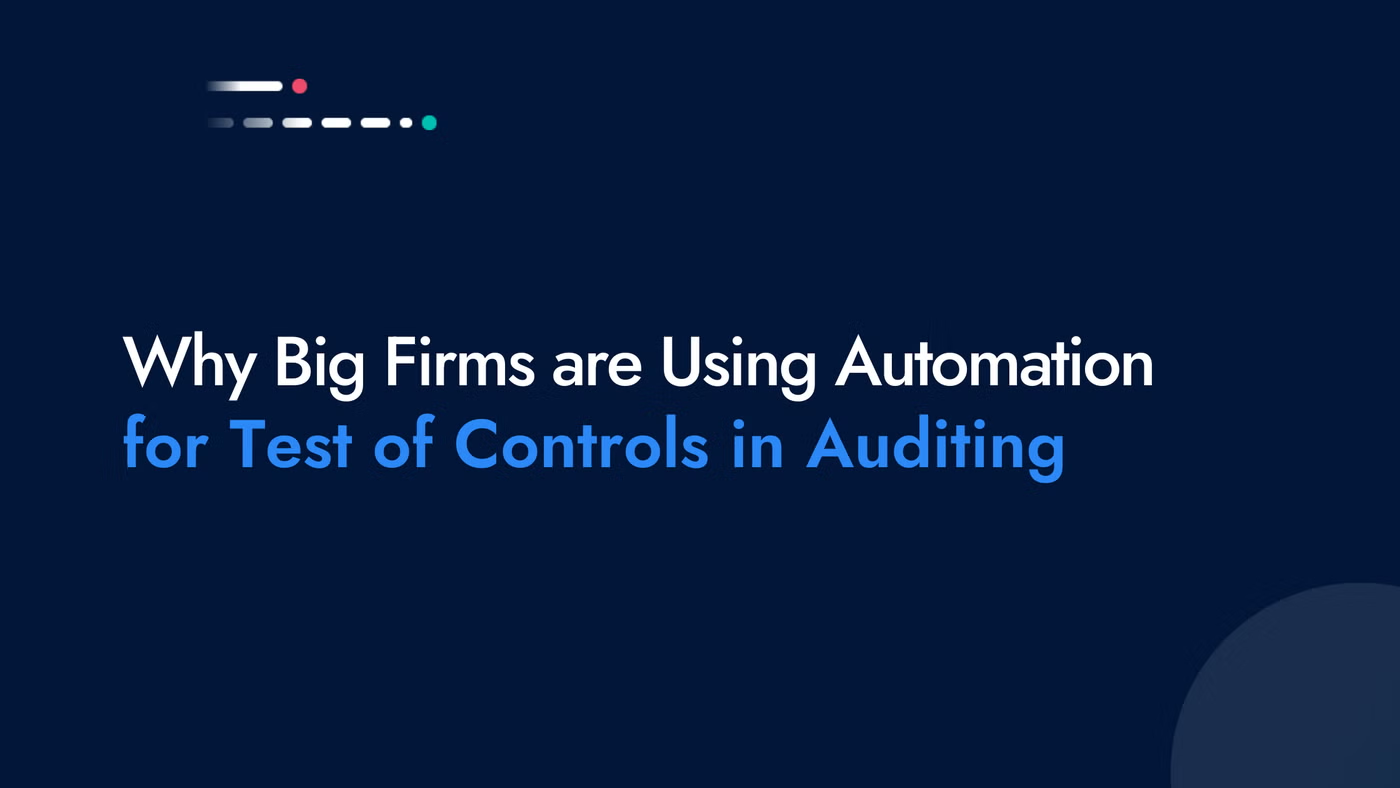- /
- Blog
Why Leading Firms are Using Automation for Test of Controls in Auditing

This article will explain why automation is transforming the audit industry and why large firms are eagerly embracing it.
Understanding the Concept of Automation in Auditing
Before we dive into why automation is gaining popularity, let's get a solid understanding of what automation means in the world of auditing.
This involves using advanced software and smart algorithms to speed up the assessment of control effectiveness, spot potential risks, and ensure compliance with regulatory standards.
Defining Automation in the Context of Auditing
Automation in auditing involves using clever software that can quickly go through massive amounts of data, handle complicated calculations, and spot potential oddities or exceptions. This lets auditors work more efficiently, concentrating on important tasks, all while reducing the chances of errors that can come with manual testing.
The Role of Automation in Test of Controls
Internal controls encompass policies and procedures established by management to ensure the accuracy of financial reporting, adherence to legal requirements, and protection of assets.
Through automation, auditors can conduct a more efficient and comprehensive analysis of the design and operation of these internal controls. By automating control testing, auditors can achieve greater precision and reliability in their assessments while simultaneously mitigating the potential for human error. This not only enhances the quality of the audit but also results in significant time savings.
The Shift Towards Automation in Big Firms
Big firms are hopping on the automation train for some pretty compelling reasons. They've figured out that automation can make audits run smoother, save them money, and lower the odds of things going wrong.
Reasons for the Growing Adoption of Automation
- Faster Data Analysis: Automation speeds up data analysis, allowing for a more thorough control effectiveness assessment.
- Reduced Human Error: It lowers the reliance on manual testing, minimizing the risk of mistakes and improving accuracy.
- Time Savings: Automation cuts down on time spent on repetitive tasks, giving auditors more time for critical analysis and value-added activities.
- Happier Team: Automation reduces the tedious and repetitive aspects of auditing, making auditors' work more engaging and satisfying.
- Greater Scalability: Automation allows firms to scale their auditing processes efficiently to meet the needs of larger and more complex organizations.
- Increased Data Security: Automation can improve data security by limiting the manual handling of sensitive information during audits.
Challenges in Implementing Automation for Test of Controls
While the benefits of automation in auditing are undeniable, it is crucial to acknowledge the challenges that firms may face in its implementation.
- Infrastructure and Software Investment: Firms may need to invest in advanced technology infrastructure and software to ensure compatibility, scalability, and data security.
- Addressing Technical Challenges: Technical challenges include data integration, system interoperability, and ensuring the accuracy and reliability of automated processes.
- Collaboration with IT and Experts: Close collaboration with IT departments and automation implementation experts is crucial for successful hurdle navigation.
- Time Constraints: Auditors often have limited time due to demanding schedules, making it challenging to find the time for automation implementation.
- Fear of Change: Trusting new technology can be perceived as risky, with numerous options available, some of which may not be suitable for the firm's needs.
Addressing Concerns about Automation in Auditing
Even though automation can offer some great benefits, auditors might have doubts or worries about jumping on board. They might be afraid of losing their jobs or just not fully convinced that automation can do the job right.
To make this shift to automated auditing smoother, it's important for firms to step in. They should offer proper training and support to their auditors to address these concerns head-on.
By showing the advantages and giving auditors the tools and know-how they need to use automation effectively, firms can make the transition easier and help everyone get on the same page.
The Future of Automation in Auditing
Adding automation to control testing isn't just a temporary fad; it's a permanent change in how auditing works. So, what's on the horizon for automated auditing?
Predicted Trends in Automated Auditing
The latest innovations have made it possible for automation solutions to seamlessly integrate with cloud-based tools like Excel online. This not only enhances flexibility but also boosts collaboration among auditors, making it easier to work together on audits regardless of their physical locations. These advancements are driving positive changes and streamlining the auditing process.
The Long-term Impact of Automation on the Auditing Industry
The impact of automation on the auditing industry in the long run promises to be transformative. As auditors increasingly embrace automation and redirect their efforts towards high-value tasks, the role of auditing will evolve into providing strategic advice and consultancy to organizations.
Moreover, automation is poised to bring about greater standardization and transparency in auditing practices, thereby fostering trust among auditors, organizations, and stakeholders. The auditing field will continue its adaptation and evolution to fully harness the potential of automation and its associated benefits.
In summary, big firms are getting the message loud and clear: automation is crucial in the world of auditing. It helps auditors assess controls better, cuts down on human errors, and makes audits run smoother.
Interested in automation but don't know where to start? Download the Choosing the Right Audit Automation Solutions checklist today!
.png?width=600&quality=70&format=auto&crop=16%3A9)
.png?width=600&quality=70&format=auto&crop=16%3A9)
